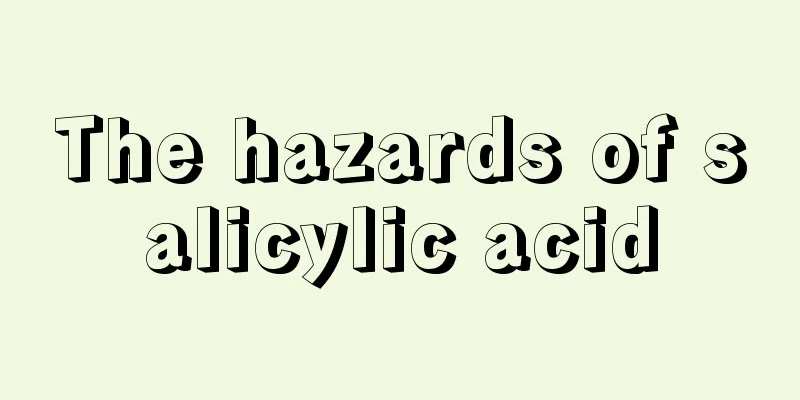The hazards of salicylic acid

|
Salicylic acid is widely used in skin care products. It can remove dandruff and acne, but not everyone can use it. Some people will experience allergic reactions such as erythema after use. If salicylic acid is used for a long time, poisoning may occur and the skin will become worse than before. When this happens, you must pay attention, stop using it in time, and ask a doctor to find the correct solution. Salicylic acid is a fat-soluble organic acid. Salicylic acid is mainly used in water-based skin care products such as floral water, prickly heat water, and quinine water. In addition to its antiseptic and bactericidal effects, it also has the functions of removing sweat odor, relieving itching and swelling, relieving pain and inflammation. Salicylic acid is used in small amounts to prepare daily flavors such as animal flavors. It is used in trace amounts in food as a preservative. Side Effects of Salicylic Acid: ① Local effect: Excessive removal of the stratum corneum will weaken the skin's defense ability and erythema, itching, stinging or allergies may occur. Therefore, the use of salicylic acid requires enhanced moisturizing and repair, and it is best to avoid contact with eyes, face, reproductive organs and mucous membranes. A small number of people may be allergic to salicylic acid and are not suitable for using salicylic acid of any concentration. ② Systemic symptoms: For general skin care and small-scale users, there should be no systemic side effects. However, patients who use salicylic acid over a large area (greater than 30% of the body area) or for a long time must pay special attention to the occurrence of salicylism effects. These symptoms include tinnitus, dizziness, fatigue, nausea and electrolyte imbalance. These symptoms are more likely to occur in children and patients with renal and liver dysfunction. If salicylic acid toxicity occurs, the drug should be discontinued immediately. ③ Excessive removal of the stratum corneum will weaken the skin's defense ability and erythema, itching, stinging or allergies may occur. Therefore, the use of salicylic acid needs to strengthen moisturizing and repair, and it is best to avoid contact with eyes, face, reproductive organs and mucous membranes. A small number of people may be allergic to salicylic acid and are not suitable for using salicylic acid of any concentration. ④Since high concentrations of salicylic acid are harmful, the Department of Drug Administration of the Department of Health has limited the concentration of salicylic acid in skin care products to between 0.2-1.5% since 1999. Skin care products containing salicylic acid must be accompanied by warnings to ensure their safety for long-term use, and are not allowed to be used by children under 3 years old. |
<<: The difference between polarized light and UV protection
>>: Sequelae of cranioplasty surgery
Recommend
What is the reason for poor amniotic fluid
Everyone knows that the place where the fetus dev...
How to do basic waist bending skills
Many people who want to learn dance know that the...
Can advanced brain cancer be cured?
Can advanced brain cancer be cured? Intracranial ...
What are the symptoms of colon cancer at different stages?
Colon cancer is a common digestive tract malignan...
Are there lymph nodes in the abdomen?
Everyone must know many types of lymphatic diseas...
Chinese medicine enema for treating renal failure
Kidney failure is a very serious disease for the ...
What to eat for invasive bladder cancer
Bladder cancer is a tumor disease that middle-age...
Can patients with early liver cancer undergo surgery?
Can patients with early-stage liver cancer underg...
Rhinitis blocks breathing difficulties
Rhinitis is a disease problem that everyone is fa...
What is the white color of mouth ulcer
It is normal for oral ulcers to have white mucous...
How to treat skin cancer recurrence in situ
Skin cancer occurs on the surface of the human bo...
Can rhinitis be cured
Not only in our country, but also in the world, t...
Pain below waist and above buttocks
Pain below the waist and above the buttocks is ge...
What fruits are good for acute pneumonia?
I believe everyone has heard the saying "An ...
What is the key to treating cervical cancer? How to treat cervical cancer
There will be no symptoms in the early stage of c...









